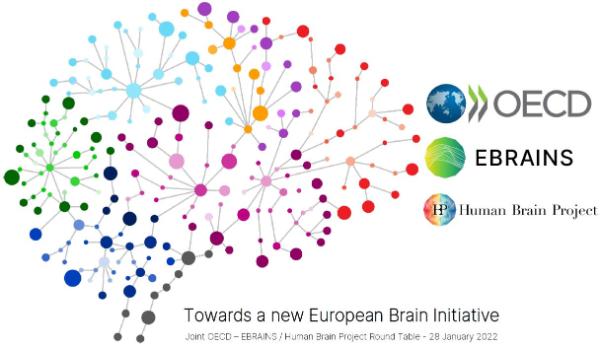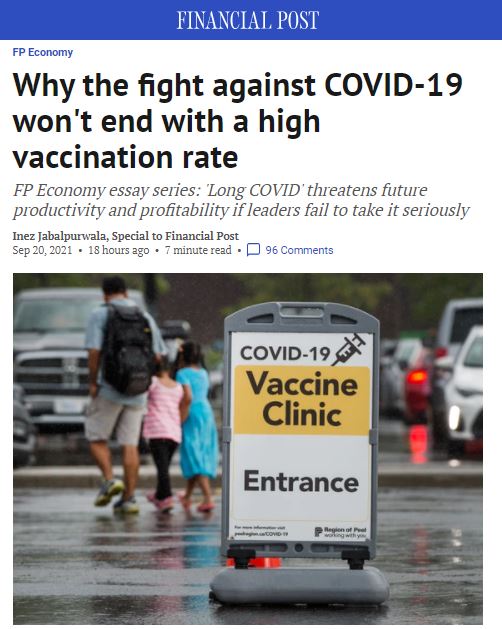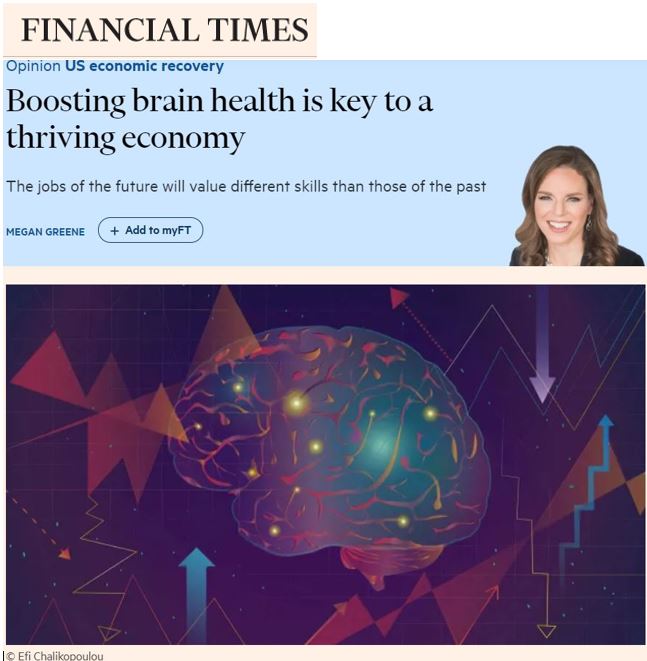Neuroscience-inspired Policy Initiative
In a world shaped by the pandemic, with all its economic implications, and in the face of new challenges posed by misinformation and mental health conditions, there is a need for new analytical approaches, tools, and insights from science to explore non-linear systems we live in. Understanding the brain, brain health, and brain disorders is essential to improving health and quality of life. It also it offers a pathway to understanding the new economic and social reality.
NAEC is working with the PRODEO Institute and various actors* on a Neuroscience-informed Policy Initiative on the concept of “Brain Capital” which considers brain skills and brain health as an indispensable part of the knowledge economy. NAEC promotes this concept as an approach for thinking about the economy and how it works in new ways and is laying some of the groundwork, looking at relevant metrics and building up a network of interested actors in the medical field, neuroscience, philanthropy and business. The initiative has entered a developmental phase examining the application of ideas originating in neuroscience and medicine to economic and social policy, including productivity, gender equality, mental health, education and others.
Towards a European Brain Initiative
Understanding the interplay between brain function and health and the economy highlights the cost and burden when function and health turn into dysfunction and disease. The impacts of adverse brain function have never been greater. However, there is a convergence of developments that might help place the brain at the centre of the EU policy agenda. There is an unprecedented dynamic for making brain health a pillar of public health policy in Europe. At the recent Round Table that EBRAINS hosted together with the OCDE’s New Approaches to Economic Challenges initiative, policy-makers from the French EU presidency - Ministère de l'Enseignement Supérieur et de la Recherche, European Commission and World Health Organization, as well as leaders of the main brain research and brain health organisations in Europe, agreed that the challenge of brain disorders in an ageing society, coupled with growing awareness of the importance of good brain health as well as progress in science call for revamping of current efforts. The situation is ripe for a new European Brain Initiative with its own pillar in the European Health Union, a holistic Brain Health Strategy, Partnership on Brain Health in the latter part of Horizon Europe, prepared by EBRA (European Brain Research Area), and alignment of research agendas across Europe, in which Human Brain Project is ready to play an active role.
Rethinking Productivity: Insights from Neuroscience
Our brains and minds are inextricably linked to productivity. Brain health disorders, such as depression, anxiety and neurodegeneration, cost the global economy trillions of dollars each year in lost productivity. Solutions are urgently required to address this. This seminar explores how the latest innovations in neuroscience can help us unlock insights into how to optimise productivity in the knowledge economy. A transdisciplinary group of speakers approach this topic from diverse perspectives such as neuroscience, global mental health, economics and finance.
Rethinking Productivity: Insights from Neuroscience - Summary
Brain Capital Grand Strategy
A seminar with the Secretary General and Admiral McRaven, on 27 January 2021, gave momentum to the initiative at a discussion of :
A Brain Capital Grand Strategy: Towards Economic Re-imagination - published in Molecular Psychiatry - an inter-disciplinary effort of medical doctors, neuroscientists and economists to which NAEC contributed. The paper argues that in our brain economy, investments in brain health and brain skills are critical for post-COVID economic renewal, re-imagination, and long-term economic resilience.
Innovations to Address Women’s Brain Health Inequalities
As part of the OECD March on Gender initiative, this seminar, supported by the NAEC Neuroscience-inspired Policy Initiative, looks into differences in neurological outcomes between men and women. Agenda
|
The COVID-19 crisis has exposed sex and gender differences in brain and mental health disorders, as we see news of a dangerous hike in depression and suicide, particularly among women. As we try to fight the virus, we are also forced to address how our behaviours and health are impacted by brain and mental disease – the area with the highest unmet medical need. Sex differences in brain health are very marked – research shows that dementia rates are higher in women compared to men, similar figures for depression and anxiety. The brain capital (brain health and brain skills in a brain economy) of women is therefore crucial as part of a Systemic Recovery. As part of the NAEC Neuroscience-inspired Policy Initiative and the OECD gender mainstreaming work, brain experts explore explore how women and men brains are different and how understanding these differences might inform gender-sensitive policies. |
Highlighting Brain-Based Inequalities for Women: From Bedside and Boardroom to Policy
Psychiatric Times (5 May 2021)
Closing the Brain Health Gap: Addressing Women’s Inequalities
Oxford University Press's Academic Insights for the Thinking World (21 August 2021)
Women's Brain Health: It's Time to Invest Brain Health, and Recognise Gender Differences
Chief Finance International (Summer 2021)
Why the fight against COVID-19 won't end with a high vaccination rate Financial Post (Canada) (20 Sept 2021)
How to Build "Brain Capital" in Nigeria, Andrew Nevin, Arise News (September 2021)
Boosting brain health is key to a thriving economy
Megan Greene, The Financial Times (12 August 2021) [download pdf]
The Brain Economy
Admiral William McRaven, NAEC, January 2021
The Brain of an Entrepreneur
The aspects that make them most creative may also be their biggest risk
Neo.Life (December 2021)
*Co-Leads:
- William Hynes DPhil, OECD
- Harris Eyre MD PhD, PRODEO Institute
Steering Committee:
- Husseini Manji MD, Johnson & Johnson
- Patrick Brannelly, Gates Ventures
- Rym Ayadi PhD, Euro-Mediterranean Economists Association and CASS Business School
- Marion Leboyer MD PhD, Fondation FondaMental
- Andrew S. Nevin DPhil, PWC Nigeria
- Cara Altimus PhD, Milken Institute
- Erin Smith, PRODEO Institute, Global Brain Health Institute and Stanford University
- Andy Keller, CEO/President of Meadows Mental Health Policy Institute
- Karen Rommelfanger, PhD, Neurotech Ethicist and Neuroinnovation Strategist, Neuroethics Co-Lab
- Paweł Świeboda, Director General, Human Brain Project
- Jay Weatherill, CEO, Minderoo Foundation





